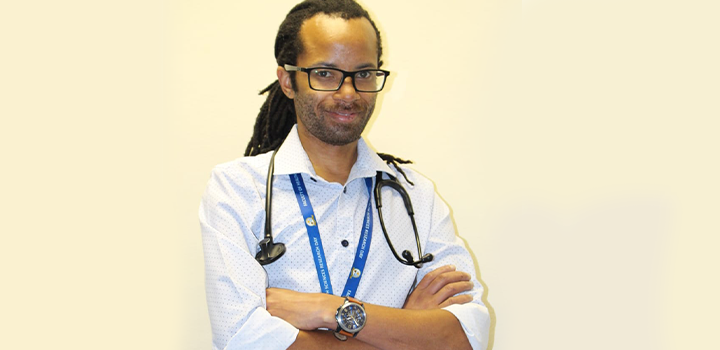No internal medicine specialists at regional hospitals? Let's train our own

It is difficult to recruit and retain specialist doctors in rural areas. A new programme, based at Pietersburg Hospital in Polokwane Mankweng Hospital Complex, aims to grow the number of specialists in Limpopo by training young doctors who already work there.
Many doctors think about internal medicine as an anchor specialty that supports most other disciplines and specialities. But there is a dire shortage of specialists in regional hospitals across South Africa, and Limpopo is no exception.
The Discovery Foundation Rural Institutional Award aims to bring more medical expertise to areas in South Africa with limited resources. This year, the grant goes to the Polokwane Mankweng Hospital Complex, which houses the Pietersburg and Mankweng hospitals.
Dr Phetho Mangena explains that the Polokwane Mankweng Hospital Complex only has four internal medicine specialists who are recognised by the Health Professions Council of South Africa, as well as one nephrologist.
"The proposal would support the hospital to recruit, train, mentor and retain specialists in internal medicine," Dr Mangena says. The 38-year-old is the only nephrologist at the 500-bed hospital, which gives tertiary care to the six million people who live in Limpopo.
He says it is not at all unusual for patients to travel 200 km or even 300 km to Polokwane for treatment. Sometimes patients have to travel even further to hospitals in Gauteng.
Dr Mangena, who heads up this new programme, was born in Botswana, raised partly in Zimbabwe and matriculated at Pax High School just outside Polokwane. He did his undergraduate and postgraduate training at the University of Cape Town, before returning to Polokwane to work as a nephrologist - the only one in the province.
No internal medicine specialists at regional hospitals
"In fact, apart from the Cuban doctor programme, there are no internal-medicine specialists at any of the regional hospitals," Dr Mangena says. "This limits the complexity of care that can be provided to patients, and also means that young doctors often don't have good supervision by experienced, more senior doctors."
It is a common problem across South Africa to recruit specialists to rural areas and to retain their services at the regional hospitals. Dr Mangena hopes that the Rural Institutional Award will help to train and retain specialists in the region in a new way.
How will the new approach work? Instead of recruiting specialists from other provinces and sending them out to the regional hospitals, the idea is to bring eager doctors from the regional hospitals to the complex for a recurring residency. The doctors will do intensive training, followed by an exit exam.
Dr Mangena is optimistic that the new programme will help to address the critical skills shortage in the province.
A new way of fixing the skills deficit
"I think that our model is more realistic and acknowledges that the current strategy will not fix the skills deficit at some of our rural institutions," Dr Mangena says. "Training the current medical officers at the regional hospitals, allied with strong support from the few specialists in the province, is more likely to produce quality health outcomes."
Pietersburg Hospital is the host and faculty of South Africa's newest medical school. Dr Mangena says this presents an exciting opportunity for doctors to practise academic medicine in a rural context.
"I would want to see this project eventually produce specialists to train future generations of doctors, and also start staffing the regional hospitals with homegrown specialists, or upskilled medical officers, for those who do not want to pursue specialisation," he explains.
"The biggest challenges in providing comprehensive internal medicine services to patients are a lack of human and medical resources," Dr Mangena adds. "To give an example, there are 100 physicians at Tygerberg Hospital, and only 15 at Pietersburg Hospital. The lack of supervision is a real problem, and we aim to address this by building mentorship networks."
"We are hoping to expand the service, and to increase the number of physicians with the use of this award. We are excited that the first intake has happened," Dr Mangena concludes.
This article was created for the 2020 Discovery Foundation Awards and has been edited for the Discovery Magazine.
About the Discovery Foundation
Since 2006, the Discovery Foundation has invested over R256 million in grants to support academic medicine through research, development and training medical specialists in South Africa.
The Discovery Foundation is an independent trust with a clear focus - to strengthen the healthcare system - by making sure that more people have access to specialised healthcare services. Each year, the Discovery Foundation gives five different awards to outstanding individual and institutional awardees in the public healthcare sector.
Related articles

Despite a challenging year marked by the global COVID-19 pandemic, the Discovery Foundation continues to support cutting-edge clinical research and medical training in South Africa's public and academic medicine sector.

Championing nuclear medicine in Limpopo, where patients struggle to access healthcare resources
If Dr Nozipho Nyakale - a nuclear medicine specialist from the Sefako Makgatho Health Sciences University - has her way, more patients at Pietersburg Hospital in Limpopo will have access to the enormous advantages this patient-targeted medicine can offer.

"Access to reproductive medicine empowers women"
While working as a gynaecologist, Dr Khatija Kadwa recognised the heavy burden that social stigma causes for women dealing with infertility. It became her mission to help women by treating infertility in under-resourced communities in South Africa.